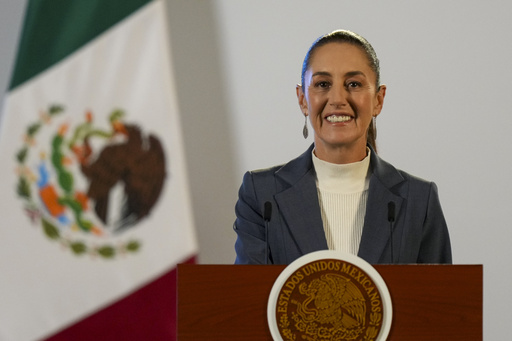
MEXICO CITY — Tensions have surfaced between Canada and Mexico following remarks made by U.S. President-elect Donald Trump regarding potential tariffs. Canadian officials asserted that the challenges faced at the two nations’ borders should not be equated.
In response to these comments, which surfaced after a discussion between Trump and Canadian Prime Minister Justin Trudeau, Mexico’s president expressed her disapproval. President Claudia Sheinbaum emphasized the importance of recognizing Mexico’s stature, particularly by its trading partners, following Canadian Ambassador Kirsten Hillman’s statement that highlighted the distinct issues of the Canadian border compared to the Mexican border.
Sheinbaum remarked that Canada also grapples with its own fentanyl crisis and that they should be appreciative of the cultural wealth that Mexico possesses. Trump’s warning of imposing a 25% tariff on goods from Canada and Mexico hinges on their efforts to mitigate the movement of migrants and drugs. The rates of drug seizures and migrant crossings are substantially different at the two borders, underpinning the complexity of the situation.
In the previous fiscal year, U.S. customs agents confiscated 43 pounds of fentanyl at the Canadian border, contrasted with a staggering 21,100 pounds at the Mexican border. Critics have pointed to Mexico’s insufficient initiatives to intercept fentanyl before it reaches the U.S., where it has been linked to approximately 70,000 overdose fatalities annually. Most of this fentanyl is produced by Mexican cartels utilizing precursors that are illegally transported from Asia.
On the immigration front, U.S. Border Patrol reported 56,530 arrests at the Mexican border just in October, while only 23,721 arrests occurred at the Canadian border during the year leading up to September 2024. Furthermore, U.S. Customs and Border Protection disclosed over 1.53 million encounters with migrants at the southwest border with Mexico during the same timeframe.
Mexican authorities are particularly sensitive to Canada’s comments, citing a historical context where they defended Canada’s interests when Trump sought to exclude Canada from the U.S.-Mexico-Canada trade agreement negotiations in 2018, although the veracity of that claim remains uncertain. Meanwhile, Trudeau took the initiative of meeting with Trump prior to Sheinbaum, as both leaders seek clarity and reassurance before the incoming president assumes office.
In a statement, Hillman indicated that Canada is prepared to invest in enhancing border security, which includes deploying more helicopters, drones, and law enforcement personnel. She highlighted an existing agreement between Canada and the U.S. that allows for the return of migrants caught entering illegally, a framework that differs from the lack of a similar arrangement between Mexico and the states.
On Monday, Sheinbaum further detailed her recent conversation with Trump, noting his concurrence on Mexico’s desire to concentrate on intelligence sharing to combat drug trafficking, which he deemed a positive approach. However, she firmly stated that Mexico would not accept direct intervention from the U.S. and would uphold the stringent regulations restricting U.S. law enforcement activities in Mexico set by her predecessor, asserting, “That is going to be maintained.”
